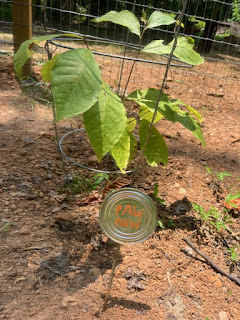Jewish Foraging: What we give, what we take, praising our past, ensuring our future
by Rabbi Michael Birnholz
~In the 1990s I was a counselor at URJ Camp Coleman. Now in a later part of my life, ordained as a Rabbi, with a family of my own, I have been honored to serve as faculty there.
Camp has always been a place of powerful experience for me. This year, when I was asked to offer an elective, I realized I could incorporate a favorite activity, wild fruit foraging, into camp as an illustration of a valuable spiritual dynamic. While I certainly get a chance to forage fruits from my local environment, picking berries from bushes scattered around Camp, located in northern Georgia, is always fun. As part of this activity, even as we looked to find these natural treats, I offered to teach a bit about general and Jewish rules for foraging. One of the crucial imperatives of foraging is to be aware of what you leave in the environment. Even as one takes from the natural world, the goal is to also preserve and protect that place for the future. While we ate blueberries at Camp Coleman, we also planted a Paw Paw Tree. With one hand we ate, were satisfied and praised the Holy One of Blessing. With the other, we gave energy to create an opportunity for future generations to get special sweetness and sustenance.

Yet, this was not just an exercise about natural sustainability. There is also the metaphorical foraging as campers, staff, faculty are constantly “taking” experiences from Camp and leaving impressions behind. We are always enjoying the “fruits” of our ancestors (Zechut Avot), planting seeds of knowledge and experience, as well as maintaining traditions, culture, and wisdom for those who follow. So much of Judaism, of our sense of Lador Vador/Generation to Generation, follows the rules of foraging, what we take and what we leave. For example, at Camp Coleman, while we ate and planted, we talked about our favorite experiences and things we learned at Camp and we looked for examples of what past generations left for us, discussing what we leave behind for those who follow.
After my experiences at Camp and now, as this year comes to an end and a new one arrives, I find myself very aware that we are always taking and giving, foraging in a sense. As I challenged those campers and myself this summer, I have to wonder, can we do forage, physically and metaphorically, and work to ensure that we infuse these actions with Kavanah/intention? Do we feel the weight/Kavod and show appreciation for what we take, and, in turn, invest energy and thought and care into what we leave behind…? Let us in this new year, even just once in a while, show care and appreciation for what we are taking and give energy and attention to what we are leaving behind.
Rabbi Michael Birnholz arrived at Temple Beth Shalom in Vero Beach in 2002 following his ordination from Hebrew Union College-Jewish Institute of Religion. Over the 20 years that Rabbi Birnholz has been in Indian River County, he and his family have had a chance to grow in body, mind and spirit right along with Temple Beth Shalom. Rabbi Birnholz enthusiastically shares his ruach and koach -spirit and strength – with the many diverse generations and facets of the Jewish community. From the biblical garden to Tot Shabbat, from Men’s Club Breakfast to adult learning while making challah, he is proud to be part of vibrant and meaningful life of his congregation. Rabbi Birnholz has also enjoyed his wide variety of community opportunities to teach and preach Jewish values and wisdom. His hope is to build Temple Beth Shalom into a House of wholeness, harmony and peace and see these efforts spread caring, compassion and justice to the whole Treasure Coast and beyond.


No Replies to "Earth Etudes for Elul 25"